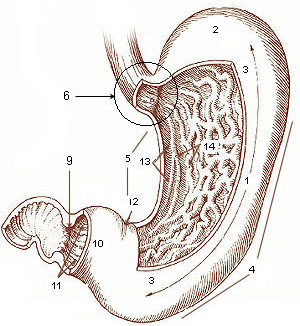Stomach
<languages /><translate>

The stomach lies just below the diaphragm in the upper part of the abdominal cavity primarily to the left of the midline under a portion of the liver. The main divisions of the stomach are the following:
Cardia[edit]
The cardia is the portion of the stomach surrounding the cardioesophageal junction, or cardiac orifice (the opening of the esophagus into the stomach). Tumors of the cardioesophageal junction are usually coded to the stomach.
Fundus[edit]
The fundus is the enlarged portion to the left and above the cardiac orifice.
Body[edit]
The body, or corpus, is the central part of the stomach.
Pyloric antrum[edit]
The pyloric antrum is the lower or distal portion above the duodenum. The opening between the stomach and the small intestine is the pylorus, and the very powerful sphincter, which regulates the passage of chyme into the duodenum, is called the pyloric sphincter.
The stomach is suspended from the abdominal wall by the lesser omentum. The greater omentum attaches the stomach to the transverse colon, spleen and diaphragm.
The common mesentery suspends the small intestine. The parietal peritoneum lies over the duodenum and other structures, such as the abdominal aorta. Because they lie behind the peritoneum, they are called retroperitoneal structures.
The figure below shows the anatomy of the stomach.
- Body of stomach
- Fundus
- Anterior wall
- Greater curvature
- Lesser curvature
- Cardia
- Pyloric sphincter
- Pyloric antrum
- Pyloric canal
- Angular notch
- Gastric Canal
- Rugal folds</translate>
|
|
|
| Human regional anatomy | ||||||||||
|---|---|---|---|---|---|---|---|---|---|---|
|
| Anatomy of the gastrointestinal tract, excluding the mouth | ||||||
|---|---|---|---|---|---|---|
|
Ad. Transform your life with W8MD's Budget GLP-1 injections from $49.99


W8MD offers a medical weight loss program to lose weight in Philadelphia. Our physician-supervised medical weight loss provides:
- Weight loss injections in NYC (generic and brand names):
- Zepbound / Mounjaro, Wegovy / Ozempic, Saxenda
- Most insurances accepted or discounted self-pay rates. We will obtain insurance prior authorizations if needed.
- Generic GLP1 weight loss injections from $49.99 for the starting dose of Semaglutide and $65.00 for Tirzepatide.
- Also offer prescription weight loss medications including Phentermine, Qsymia, Diethylpropion, Contrave etc.
NYC weight loss doctor appointmentsNYC weight loss doctor appointments
Start your NYC weight loss journey today at our NYC medical weight loss and Philadelphia medical weight loss clinics.
- Call 718-946-5500 to lose weight in NYC or for medical weight loss in Philadelphia 215-676-2334.
- Tags:NYC medical weight loss, Philadelphia lose weight Zepbound NYC, Budget GLP1 weight loss injections, Wegovy Philadelphia, Wegovy NYC, Philadelphia medical weight loss, Brookly weight loss and Wegovy NYC
Linkedin_Shiny_Icon Facebook_Shiny_Icon YouTube_icon_(2011-2013) Google plus
|
WikiMD's Wellness Encyclopedia |
| Let Food Be Thy Medicine Medicine Thy Food - Hippocrates |
Medical Disclaimer: WikiMD is not a substitute for professional medical advice. The information on WikiMD is provided as an information resource only, may be incorrect, outdated or misleading, and is not to be used or relied on for any diagnostic or treatment purposes. Please consult your health care provider before making any healthcare decisions or for guidance about a specific medical condition. WikiMD expressly disclaims responsibility, and shall have no liability, for any damages, loss, injury, or liability whatsoever suffered as a result of your reliance on the information contained in this site. By visiting this site you agree to the foregoing terms and conditions, which may from time to time be changed or supplemented by WikiMD. If you do not agree to the foregoing terms and conditions, you should not enter or use this site. See full disclaimer.
Credits:Most images are courtesy of Wikimedia commons, and templates, categories Wikipedia, licensed under CC BY SA or similar.
Translate this page: - East Asian
中文,
日本,
한국어,
South Asian
हिन्दी,
தமிழ்,
తెలుగు,
Urdu,
ಕನ್ನಡ,
Southeast Asian
Indonesian,
Vietnamese,
Thai,
မြန်မာဘာသာ,
বাংলা
European
español,
Deutsch,
français,
Greek,
português do Brasil,
polski,
română,
русский,
Nederlands,
norsk,
svenska,
suomi,
Italian
Middle Eastern & African
عربى,
Turkish,
Persian,
Hebrew,
Afrikaans,
isiZulu,
Kiswahili,
Other
Bulgarian,
Hungarian,
Czech,
Swedish,
മലയാളം,
मराठी,
ਪੰਜਾਬੀ,
ગુજરાતી,
Portuguese,
Ukrainian

